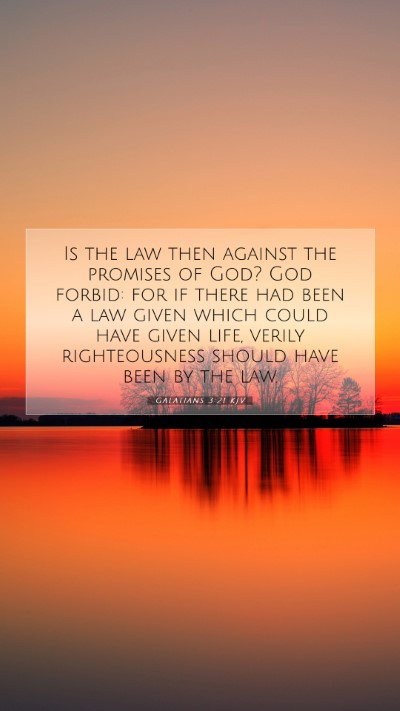Bible Verse Meaning: Galatians 3:21
In Galatians 3:21, the Apostle Paul writes:
"Is the law then against the promises of God? God forbid: for if there had been a law given which could have given life, verily righteousness should have been by the law."
Overview of Galatians 3:21
This verse serves as a critical point in Paul's argument regarding the relationship between the Law and the promises of God. Paul asserts that the Law is not contrary to God's promises. Instead, it serves a distinct purpose. He emphasizes that if the Law could provide life and justification, then righteousness would stem from it. However, the reality is that the Law highlights human insufficiency and points to the need for grace through faith in Jesus Christ.
Insights from Public Domain Commentaries
Matthew Henry's Commentary
Matthew Henry asserts that the Law and the promises of God are not contradictory. He indicates that the Law was given to reveal sin and the need for salvation, rather than to grant life or righteousness. Henry elaborates that the Law's role was to bring humanity to the point of recognizing its need for Christ. The promises given to Abraham, characterized by faith and grace, stand independent of the Law.
Albert Barnes' Notes on the Bible
Albert Barnes emphasizes that the Law cannot impart spiritual life or righteousness. He highlights that the weakness of the Law lies in the inability to justify sinners. Barnes argues that the Law was not meant to be the source of justification but was designed to show that righteousness comes through faith in Jesus Christ. He further explains that Paul is reinforcing the idea that while the Law is holy and just, it cannot fulfill God's promise of salvation.
Adam Clarke's Commentary
Adam Clarke furthers the discussion by questioning the idea of the Law being contrary to divine promises. He suggests that the Law served to illustrate human failure and the need for grace. Clarke notes that the promise of faith in Christ is what ultimately brings life and righteousness, contrasting sharply with the rigidity of the Law. He warns against relying solely on the Law for salvation, underscoring its purpose as a temporary guide until the coming of Christ.
Key Themes and Applications
- The Nature of the Law: The Law is not the means to righteousness but reveals the need for it. It highlights humanity's failures and drives believers toward faith in Christ.
- The Promises of God: God's promises, grounded in grace and faith, offer true hope and life, in stark contrast to the limitations of the Law.
- Faith Over Works: Believers are reminded that faith in Jesus Christ is the true path to righteousness, rejecting any notion that works of the Law can save.
- Historical Context: Understanding the early Church's struggles with the Law provides vital context for interpreting this passage. Paul addresses believers who are tempted to revert to legalism.
Related Scripture Cross-References
- Romans 3:19-20 - Discusses how the Law brings the knowledge of sin.
- Galatians 2:16 - Reiterates that a person is not justified by the works of the law but by faith in Jesus Christ.
- Ephesians 2:8-9 - Affirms that salvation comes by grace through faith, not by works.
- Hebrews 7:18-19 - Explains the limitation of the Law in making anything perfect, contrasting it with the new covenant.
Conclusion
Galatians 3:21 is a profound reminder of the difference between the Law and the grace offered through faith in Jesus Christ. It emphasizes the need for compassion over condemnation, hope over despair, and faith over works. For those exploring Bible verse meanings and seeking understanding of Scripture, this verse provides essential insights into the nature of God’s promises and the role of the Law in the life of believers.


